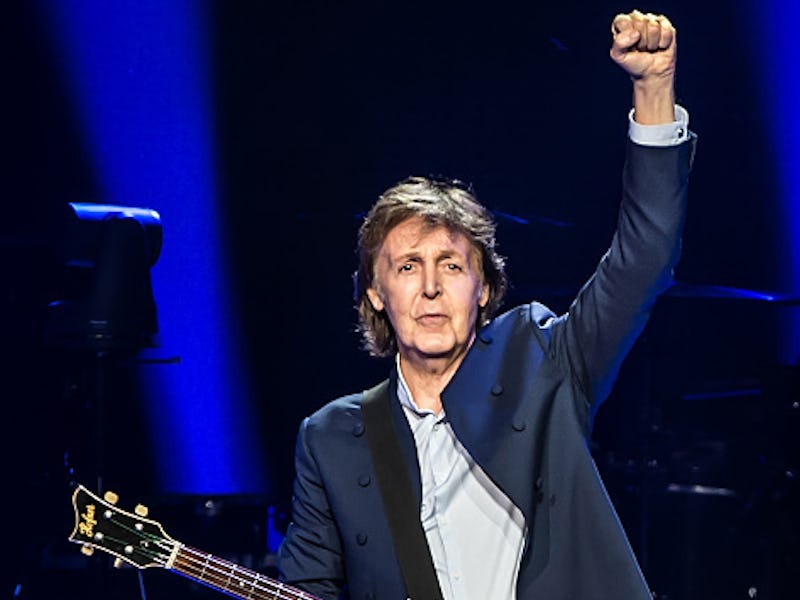McCartney Resents Lennon: The Most Unsurprising Surprise in Beatles History
Sir Paul scratches an old itch in his new Esquire profile

The long Fourth of July weekend overshadowed news of Paul McCartney’s new Esquire profile. The candid statements McCartney made to writer Alex Bilmes are perhaps not a big revelation as much as a unambiguous articulation of something most Fab Four aficionados have suspected for a long time: McCartney, for all his cheerful mugging and nostalgic remembrances of huddling around the upright piano in Liverpool writing paradyme-shifting chart-toppers with John, harbors some pent-up resentments toward his former bandmate. We might have assumed this, but yet somehow this feels like one of the first major developments in the extended Beatles narrative since George Harrison’s death.
Nearly everything McCartney did following the Beatles’ dissolution exacerbated the dichotomy between the image of John the prickly visionary who spoke truth to power and Paul, the guy writing “La, la, la” choruses and silly love songs. But according to McCartney, his inferiority complex seems to have gotten worse after Lennon’s murder when, inevitably, his “martyr legend” sprouted and grew in all directions. As McCartney bluntly puts it, he became “a James Dean and beyond” or “a JFK.” As time went on, McCartney also became more concerned with getting his name ahead of John’s on the publishing credits for songs he wrote, blaming Lennon and eventually Yoko for the perpetuation of the well-known “Lennon/McCartney” tag.
At this point, one might have assumed McCartney was too rich and otherwise beloved to care, and the main thing that is shocking about the piece is that a man so focused on presenting a clean-cut and impenetrable image — the article explored what an almost eerily well-oiled machine Mac is in his two-and-a-half-hour-plus live shows — would volunteer any controversial sentiments. It seems like he’d so on grinning and raving up his “Judey, Judey, Judey”s in stadium happily for the rest of his days, his eyes twinkling when recalling, in stage banter or TV spots, the old days. Yet, here, without much prompting, McCartney’s happy to spit a healthy bit of vitriol to offset his well-cemented image as (as Bilmes puts it) “pop culture’s slightly embarrassing uncle.”
The few shocking pull quotes, though, aren’t as questionable as the larger picture the interview paints. McCartney has always seemed to be a man somewhat obsessed with what people think of him; at least, he’s hyperaware of how they have historically responded to him. Musically, this self-consciousness manifested itself in his writing; often, his main influence as a solo musician seems to be his ‘60s self. In Esquire, he quixotically imagines recapturing the impact of, for starters, “Let It Be”: “You might not be able to make a record as Beatle-y or as harmonious as the record we made. But it doesn’t stop me trying.” The year the Beatles broke up Lennon was already singing “I don’t believe in Beatles/ I just believe in me” in front of a scrappy rock trio, but this was never true of McCartney. Post-Beatles projects from the one-man McCartney I and II to wife-and-husband-driven Wings felt much more “Look, I can do it all myself…can’t I?” and colored within the lines of his own pre-established template of pop catharsis than Lennon’s often political and confrontational recordings.
And Macca’s brand of insecurity, unfortunately, is neither “cool” or even charming. In the interview, his attempts at self-effacement feel a bit forced. His jokes, as usual, are not funny and are occasionally offensive. Here, he does an accent-backed impression of Yoko Ono overstating Lennon’s role in the Beatles, and responds, diminutively, “‘Fuck you, darling! Hang on! All I did was book the fucking studio?’” He refers to himself in the third person, with a slightly soulless-feeling simplicity (“You name me another group of four chaps, or chapesses, who had what The Beatles had. Lennon’s skill, intelligence, acerbic wit, McCartney’s melody, whatever he’s got, Harrison’s spirituality…”).
So much of the time — in this interview and elsewhere — McCartney seems to be a man looking at his achievements from the outside, suggesting a man who is, to various degrees, enamoured of his own fame (“‘So if I’m singing ‘Eleanor Rigby’, I’m me now reviewing the work of a twentysomething and I’m going, “Whoa, that’s good’”). In Esquire, his feelings seem to be emanating more directly from the inside. They are expected ones, but articulated even more transparently than usual — something of a confirmation of a skeptical fan’s worst fears rather than a sharp, humanizing new look. The interview captures a man, now in his early seventies, who seems to be drawn back toward his distant past at every turn. “‘You can see it’s always exciting for me, talking about it all,’” McCartney says to Bilmer at the end of the interview, “‘Because, you know, it’s a pretty cool thing.’” The fact that he’s someone, as far as cultural heroes go, more than qualified to be having his cake and eating it doesn’t stop the gnawing feeling of distaste when you see him doing it, or, perhaps, asking for more.